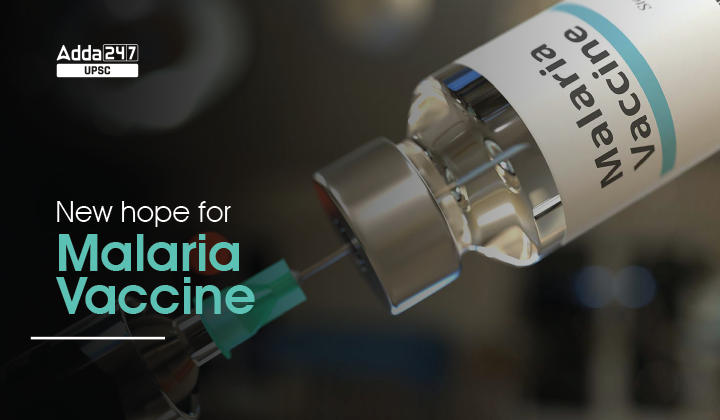Table of Contents
New hope for Malaria Vaccine
Relevance for UPSC Exam: GS Paper 3- Science and Technology- Developments and their Applications and effects in everyday Life
New hope for malaria vaccine: In News
The World Health Organization’s (WHO) recently approved RTS, S/AS01 (Mosquirix) developed by GlaxoSmithKline for immunizing children against malaria was a big milestone after decades of gradual progress.
What is Malaria disease?
Malaria is a mosquito-borne infectious disease that affects humans and other animals. It is caused by the bite of the female Anopheles mosquito if the mosquito itself is infected with a malarial parasite.
There are five kinds of malarial parasites out of which Plasmodium falciparum (parasite is responsible for 70% of cases in India), and Plasmodium vivax (globally, the commonest ones).
New hope for malaria vaccine: Need to develop vaccine
- According to the WHO’s World Malaria Report 2021 –
- Globally, there were an estimated 241 million malaria cases in 2020 in 85 malaria-endemic countries.
- India contributed 1.7% of malaria cases and 1.2% of deaths globally.
- Most of this increase came from countries in the WHO Africa Region, which accounted for 95% of cases.
- Malaria deaths increased by 12% globally in 2020 compared with 2019, the majority of whom are children under the age of five.
- Given the parasite’s very complex life cycle that correlates with protective immunity has been difficult.
New hope for malaria vaccine: About the RTS, S/AS01 (Mosquirix) vaccine
- It is named RTS because it was engineered using genes (repeat (‘R’) and T-cell) of the protein of the Plasmodium falciparum malaria parasite together with a viral surface antigen (‘S’) of the hepatitis B virus (HBsAg).
- This protein was then mixed with additional HBsAg to improve purification, hence the extra “S”.
- To boost immune responses, all protein-based recombinant vaccines rely heavily on a strong adjuvant (help vaccines work better). RTS, S is formulated with an adjuvant called AS01 developed at GSK.
New hope for malaria vaccine: India’s situation
Though basic malaria research has been robust in India, there is a significant gap in the establishment of safe and scientifically robust control human infection models for diseases such as malaria or influenza.
- With a highly successful and devoted vaccine-producing biopharma industry, India should be able to lead the world in vaccine development and production.
- To aid scientists in the development of novel vaccines against infectious diseases, long-term continuous funding, and regulatory and logistic processes must be better coordinated.




 TSPSC Group 1 Question Paper 2024, Downl...
TSPSC Group 1 Question Paper 2024, Downl...
 TSPSC Group 1 Answer key 2024 Out, Downl...
TSPSC Group 1 Answer key 2024 Out, Downl...
 UPSC Prelims 2024 Question Paper, Downlo...
UPSC Prelims 2024 Question Paper, Downlo...




